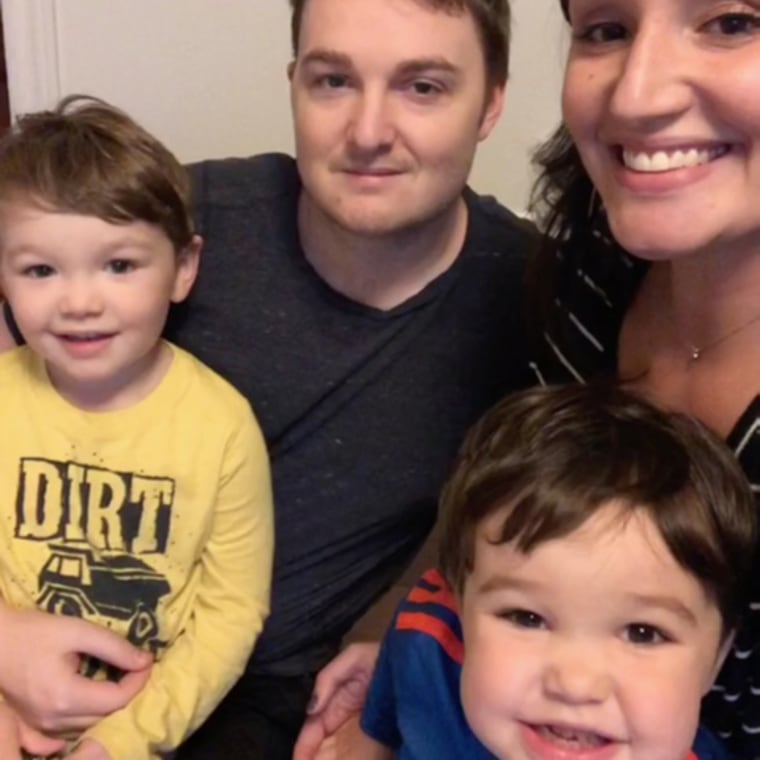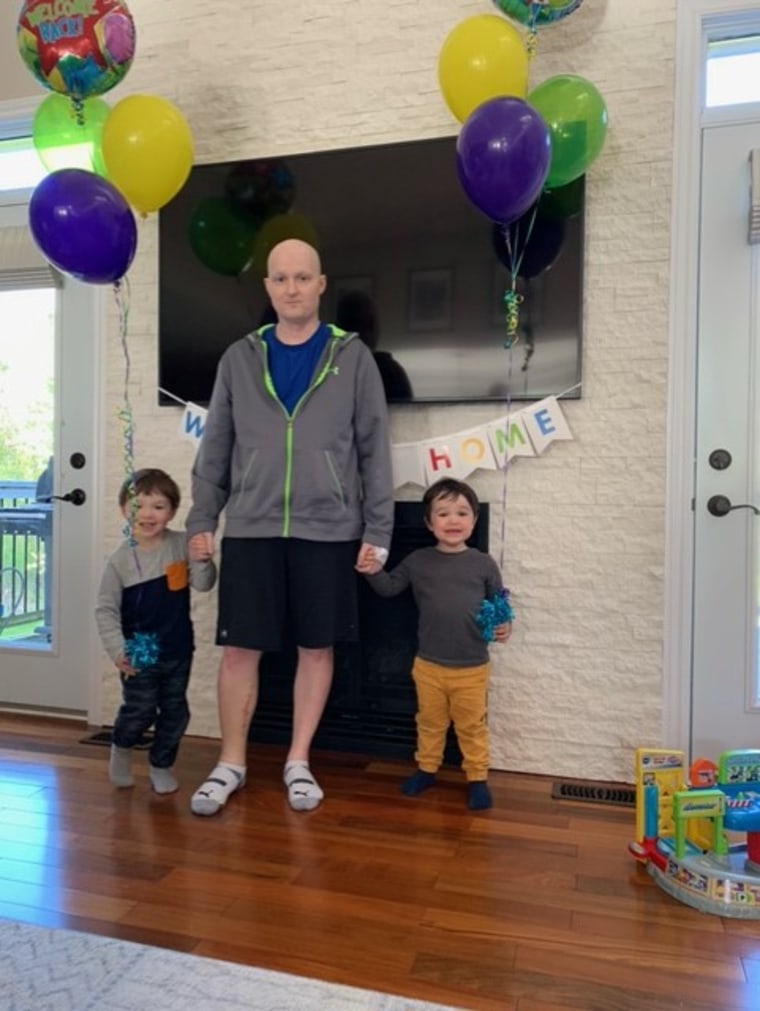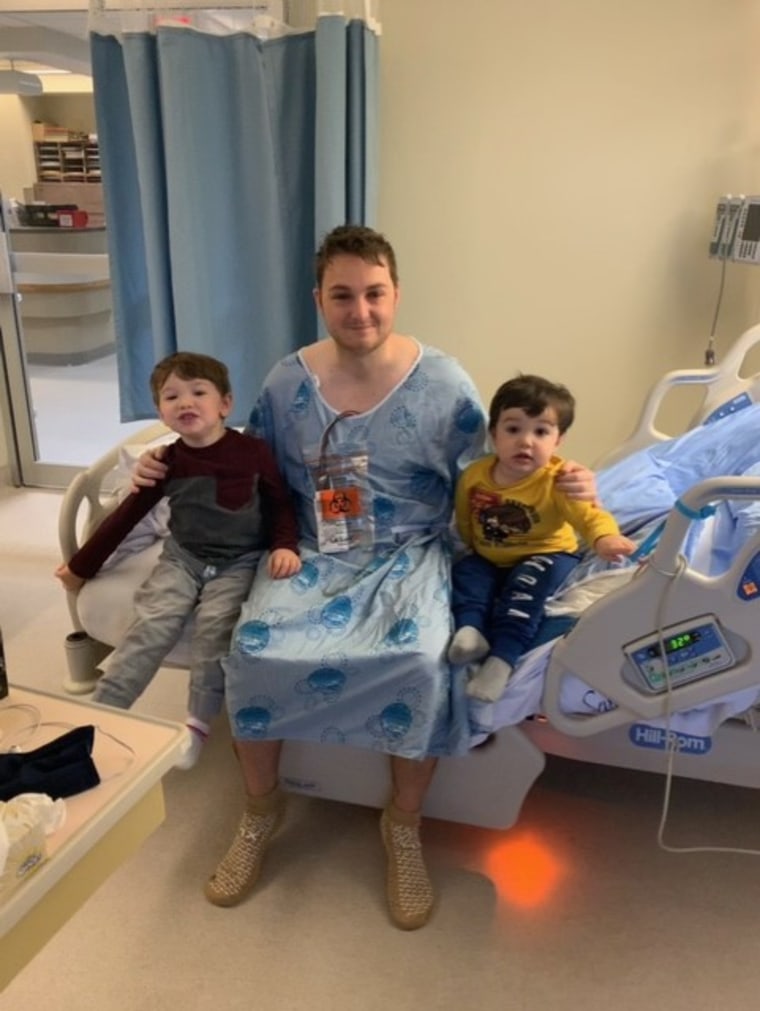The heart is not immune to cancer.
It’s a startling, little-known fact, but cardiac sarcoma — though rare — can strike at random and kill quickly, with few doctors who know how to effectively treat tumors that start in the heart.
Like most people, Ross Mangan, a 31-year-old accountant and father, had never heard of heart cancer before his diagnosis. He’d been healthy and active, playing hockey, soccer, golf and baseball. He never smoked or engaged in other harmful habits. There’s no history of the disease in his family.

So when Mangan started experiencing chest pain out of the blue last fall, he thought it was a chest cold. A COVID-19 test came back negative, so he wasn’t concerned.
But at the beginning of November, the chest pain became so unbearable one night that he couldn't lie down flat when he went to bed. When Mangan stood up, he fainted. That’s when his wife called 911.
“Even when the paramedics were here, I didn't want to go. I just figured it was nothing,” Mangan, who lives in Kingston, Ontario, told TODAY. But he was rushed to the hospital and ended up fainting three more times.
“The next day a doctor came in and said, ‘You've got this massive tumor on your heart. We believe that it's a cancerous tumor. And you’ve got less than a year to live because there's really not much we can do for you,’” he recalled. “It was the worst day … My wife was there and we just started crying, and I started thinking about my kids.”
Cancer tumors that start in the heart are so rare that most heart surgeons go through their whole careers without seeing one case, said Dr. Robert Cusimano, a cardiac surgeon at Toronto General Hospital, who specializes in heart cancer and treated Mangan. It's more common to have cancer spread to the heart from somewhere else in the body.
There may be fewer than 10,000 cases of cardiac sarcoma a year in the world, Cusimano estimated. Studies have put the incidence of primary heart tumors at 0.02% — or 200 in 1 million autopsies — and many of those are benign. But when cancerous tumors do invade the heart, they’re aggressive and often don’t produce symptoms — such as shortness of breath, chest pain and fainting — until they’re large.
The disease appears to strike people at random, though so little is known about it that Cusimano is trying to create an international database of cases to understand more. He also leads a conference to educate surgeons on treatment strategies.
“It's a very rapidly lethal cancer. The average life span, if you leave it untreated, is about two months,” Cusimano said. “These people are being told to ‘Go home and die. There's nothing we can do for you,’ but in fact, there is.”

Treatment starts with a biopsy and chemotherapy to shrink the tumor. Many doctors would want to operate right away, but that’s a mistake because the tumor can involve too many areas of the heart when it’s first detected, Cusimano noted. It’s better to wait and see if a patient responds to chemotherapy. If the cancer gets smaller, it’s then that surgery can work to remove the growth.
When Mangan was referred to Cusimano last fall, his situation was dire. The tumor was causing fluid to build up around the sac that surrounds the heart, causing chest pain and moments when the heart stopped.
“Without any treatment at all, he would not have made it to Christmas,” Cusimano said.
The cancer started inside Mangan’s heart, grew out, started surrounding the organ and then grew in. It was wrapped around valves and blood vessels. But it hadn’t spread beyond the heart and shrank away from important structures after six months of chemotherapy. When it reached a manageable size, Cusimano could try to go in and remove it.
The open-heart surgery took place on May 5 and lasted more than six hours. Cusimano removed two blood vessels and a heart valve, and had to rebuild about a quarter of Mangan’s heart.
“I'm a heart transplant surgeon, so I'm used to cutting (into) people's hearts, but this is a little bit more advanced than that,” he said.
Mangan received a bypass and heart valve replacement. Lab results after the surgery showed there was no cancer left behind.

He’s a stay-at-home dad during his recovery, taking time off work as he heals and savoring the time with his kids, who are 3 and 4 years old. His heart is functioning well, he said, and he walks for an hour every day. He can’t lift heavy objects, but otherwise has few restrictions after the surgery.
Because heart cancer is so rare, doctors don't know what Mangan’s long-term outlook is, but his prognosis is “better than it was before, for sure,” Cusimano said. He’ll be monitored for any recurrence.
For Mangan, everything is much more positive now.
“I don't feel any anger or disappointment that it happened to me. Obviously, I wish that it didn't happen,” he said. “(But) everything that needed to go right for me when I had the worst odds did… I feel very lucky with the way that things turned out.”
